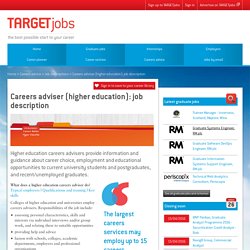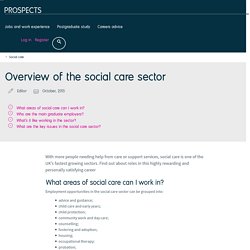

Adult guidance worker job profile. Adult guidance workers help clients clarify options and make informed choices about their future by offering information, advice and guidance (IAG) on education, training and work opportunities.

They often work with people at times of transition brought about by factors such as redundancy, health issues, or a desire or need to change career. They may work as part of a team in a large organisation or as a sole operator in a voluntary group. Some of the role can also overlap with that of a careers adviser. Work may focus on hard to reach or marginalised groups including unemployed or disabled people, adults with health and social needs or learning difficulties, and people with few educational qualifications.
This sector is subject to frequent change, sometimes due to cuts in government funding, and is becoming more target driven. Types of adult guidance worker Adult guidance workers encompass a number of job roles including: Responsibilities Tasks generally involve: Salary Working hours Skills. Higher education careers adviser job profile. A higher education (HE) careers adviser provides information, advice and guidance to undergraduates, graduates and postgraduates through individual interviews and group work.

They assist clients in assessing their values, interests, abilities and skills and relate these to opportunities for employment, further study and training. They help clients make informed decisions, develop strategies and career plans as well as advising on how to present themselves effectively at interviews and cope with the transition from HE to employment. Careers advisers also work with academic colleagues to promote the employability of students, including careers education within the curriculum, and liaise with employers to help them recruit students and graduates. In small services, careers advisers may take responsibility for information work, employer liaison activities and administration as well as guidance. Alternative job titles may be career coach, career counsellor or careers and employability adviser. Careers adviser (higher education): job description. What does a higher education careers adviser do?

Typical employers | Qualifications and training | Key skills Colleges of higher education and universities employ careers advisers. Responsibilities of the job include: assessing personal characteristics, skills and interests via individual interviews and/or group work, and relating these to suitable opportunities providing help and advice liaison with schools, colleges, academic departments, employers and professional organisations organising work placements writing careers literature, action plans and reports making presentations working with academic departments to provide Career Management Skills (CMS) sessions running workshops undertaking psychometric and personality testing using specialist computer-aided guidance applications attending conferences contributing to the work of AGCAS. Qualifications and training required Key skills for higher education careers advisers.
Overview of the social care sector. With more people needing help from care or support services, social care is one of the UK's fastest growing sectors.

Find out about roles in this highly rewarding and personally satisfying career What areas of social care can I work in? Employment opportunities in the social care sector can be grouped into: advice and guidance;child care and early years;child protection;community work and day care;counselling;fostering and adoption;housing;occupational therapy;probation;psychology;residential care;supporting independent living;therapies (e.g. art, music, drama);youth and community work. You could choose to provide care for a specific group such as: adults; children; elderly people; families; or those with mental ill health; physical disabilities; learning disabilities; or alcohol or drug dependency. Social workers are employed in a variety of the above areas and in larger organisations there are management roles in HR, finance, IT and marketing. Who are the main graduate employers?